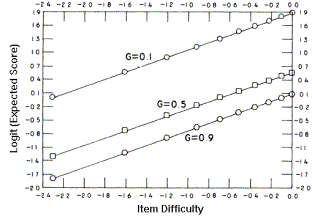Georg Rasch was concerned to construct measurement models with "parameters that are specific to the individuals" (1960, p. 9). An early extension of the Rasch model specified that the "individuals" were to be treated as random variables drawn from some distribution. This is now done routinely using the PROX algorithm and Marginal Maximum Likelihood Estimation MMLE.
Lalitha Sanathanan in "Some Properties of the Logistic Model for Dichotomous Response" (JASA, 69, 347, 744-749, 1974!) attempts this, but immediately encounters a major hurdle, the multiplicative form of the Rasch model then in common use. After Herculaean effort, she derives a simple approximation, but is forced to present it in additive form in order to make it tractable. Rewritten, the approximation is:
![]()
where N is the sample size, Si is the number of correct answers to item i, and Di is the difficulty of item i. α and β are sample dependent, but how they relate to the mean and standard deviation of the distribution is omitted from the paper. In fact, this formulation is equivalent to the PROX equation for a sample distributed N(μ,σ²), when
![]()
and
![]()
Sanathanan realizes that she has "shown how the parameters in the model can be calculated in a rough ready manner" (p. 749), but the utility of her insight was lost due to her abstruse math.

Sanathanan's plot of expected score against item difficulty for different sample distributions.
Random effects Rasch model. Sanathanan, L. … Rasch Measurement Transactions, 2002, 16:2 p.881
| Forum | Rasch Measurement Forum to discuss any Rasch-related topic |
Go to Top of Page
Go to index of all Rasch Measurement Transactions
AERA members: Join the Rasch Measurement SIG and receive the printed version of RMT
Some back issues of RMT are available as bound volumes
Subscribe to Journal of Applied Measurement
Go to Institute for Objective Measurement Home Page. The Rasch Measurement SIG (AERA) thanks the Institute for Objective Measurement for inviting the publication of Rasch Measurement Transactions on the Institute's website, www.rasch.org.
| Coming Rasch-related Events | |
|---|---|
| Jan. 16 - Feb. 13, 2025, Fri.-Fri. | On-line workshop: Rasch Measurement - Core Topics (E. Smith, Winsteps), www.statistics.com |
| Apr. 8 - Apr. 11, 2026, Wed.-Sat. | National Council for Measurement in Education - Los Angeles, CA, ncme.org/events/2026-annual-meeting |
| Apr. 8 - Apr. 12, 2026, Wed.-Sun. | American Educational Research Association - Los Angeles, CA, www.aera.net/AERA2026 |
| May. 15 - June 12, 2026, Fri.-Fri. | On-line workshop: Rasch Measurement - Core Topics (E. Smith, Winsteps), www.statistics.com |
| June 19 - July 25, 2026, Fri.-Sat. | On-line workshop: Rasch Measurement - Further Topics (E. Smith, Winsteps), www.statistics.com |
The URL of this page is www.rasch.org/rmt/rmt162i.htm
Website: www.rasch.org/rmt/contents.htm